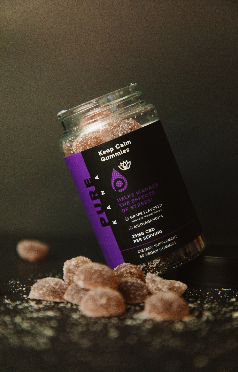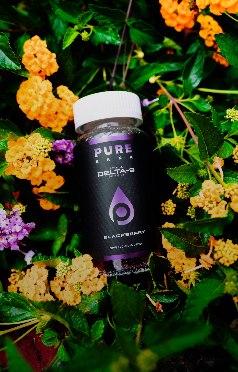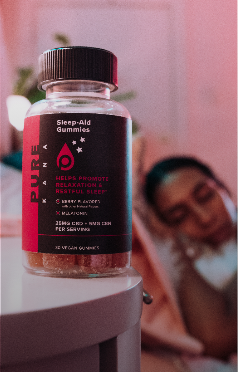For many, CBD is indispensable when it comes to fatigue, stress, and general anxiety – and often, these things are amplified during times of travel. Unfortunately, traveling with CBD can be troublesome depending on which state you live in, and which state you’re going to.
The matter of whether or not you can travel with CBD may be a little more complex than you expect, so we’ve put together this guide to break things down for you and hopefully clear a few things up.
Can You Fly with CBD?
When flying, federal law applies whether you leave your state or not. Therefore, it’s important to ensure you’re following all the rules to avoid legal trouble. The Transport Security Administration (TSA) is the organization responsible for preventing passengers from taking banned goods on planes.
The TSA’s main focus is aviation security, and they are primarily looking for weapons and explosives. In fact, the organization says that it does not actively search for drugs. However, if an illicit substance is discovered during screening, they can turn it over to law enforcement officials.
According to current regulations, flying with CBD is permitted in the U.S. as long as the CBD is hemp-derived and contains no more than 0.3% CBD, which is the legal requirement according to the 2018 Farm Bill. Additionally, in line with TSA rules, all liquids must be less than three ounces. Another important rule is that vape pens are allowed in your carry-on, but not in checked luggage due to the potential fire hazard.
If you’re traveling abroad, be sure to research the CBD laws in that specific country to ensure you’re up-to-date on their regulations. After all, no one wants to get caught in legal trouble in a foreign country.
Can You Travel with CBD Oil?
To reiterate the answer above, yes – you should have no problems traveling with CBD oil within the U.S., as long as the product is derived from hemp. Since hemp is legal at a federal level, you can take hemp-derived products on flights. However, marijuana-derived CBD oil remains illegal in many states, so it’s not recommended to cross state borders with these types of products.
At PureKana, we sell some of the most popular CBD products in the USA, and our brand has become synonymous with trust, quality, and authenticity. Our entire range of hemp-derived CBD oils are made right here in the USA, and contain less than 0.3% THC. Moreover, we offer a variety of flavors and formulations to choose from, whether you’re looking to get a better night’s sleep, find some relief from aching muscles, or simply want to lower your stress and relax before a long flight.
Can You Travel with CBD Cream?
CBD cream follows the same rules as CBD oil; as long as the product is hemp-derived, traveling with pain-relieving CBD cream is allowed. You can transport it in your carry-on or checked baggage when flying. The great thing about CBD cream is that it’s less likely to attract unwarranted attention, since it often resembles regular creams.
Can You Travel with CBD Edibles?
Similarly, traveling with CBD gummies and other edibles is also permitted as long as the items originate from hemp. In fact, gummies are one of the easiest and most practical ways to travel with CBD. They are discreet enough to go unnoticed and generally come in inconspicuous packaging. You can also easily pop a gummy in your mouth while on board with no one noticing that you are consuming CBD. PureKana’s popular sleep gummies are an excellent choice to help make any flight more manageable, and we offer several relaxing vegan-friendly options that will not make you drowsy.
Traveling with CBD in the US
As we’ve said, hemp-derived CBD products are legal if they contain no more than 0.3% THC. However, there are still many uninformed, zealous officials keen to enforce their states’ tighter rules. Therefore, it’s best to be prepared for some scrutiny.
There is no way for officials to immediately know whether a CBD product is hemp or marijuana-derived, or if it contains less than 0.3% THC. Even though you may be perfectly within the legal limit, you could encounter an official who assumes the worst. Therefore, it’s worth traveling with the product’s respective certificate of analysis.
A certificate of analysis (CoA) is a report that confirms the product has been lab-tested and verifies the cannabinoid potency profile. Most reputable CBD brands (including us here at PureKana) publish these reports on their websites, so print it out and take it with you when you travel. If you can’t find it, request it from the brand. The report should relay the THC percentage. If stopped by an official, you can show the report and prove that your CBD product meets legal requirements.
Another issue is that there are discrepancies between state and federal law. States can either adapt to national law or introduce their own. So although CBD may be legal on a federal level, it’s legal under certain conditions in some states. Be sure to familiarize yourself with the laws pertaining to states you’re traveling to and from to prevent problems. Iowa, Idaho, and South Dakota are three states with the strictest CBD laws.
In certain states, Customs and Border Patrol may refer cases to local and state officers. Generally, though, this is dependent on what you’re carrying. At the end of the day, it’s up to the official’s discretion whether or not they will inspect the product and perhaps take further action.
Traveling with CBD Outside the US
Every country has its own rules and regulations regarding CBD, which means guidelines are a lot less clear-cut when traveling with CBD oil internationally.
When traveling abroad, it’s best to do thorough research into the laws of the country you’re planning to visit. CBD is illegal in several European countries, including Iceland and Montenegro, and certain Asian countries such as Vietnam and Cambodia. Moreover, cannabis products, including CBD, are banned in most of Africa and the Middle East.
Asia and the Middle East are renowned for having strict policies and laws, so it’s often not worth the risk of traveling with CBD to these regions. Penalties can be anything from a hefty fine to jail time. Thailand, India, and South Korea are the most CBD-friendly nations in Asia.
Aside from the U.S., the nations known for having the most liberal view on CBD include the Netherlands, Canada, and Italy. Australia is starting to become more accepting of hemp, but there are still some strict laws regarding CBD.
Overall, it’s best to exercise caution when crossing international waters since there is a great variance in laws from country to country. Even countries in which CBD is legal may have different requirements regarding the THC level. Plus, there will be different rules regarding the amount of CBD you may travel with.
Benefits of CBD for Travelers
There are numerous reasons travelers use CBD. Most notably, though, it can be very helpful for those who suffer from travel anxiety. Whether you have a fear of flying or get tense and a little wound up when traveling with family, CBD is a popular way to calm the mind and soothe the body.
It can also provide some much-needed relief from swelling and joint pain. Poor blood circulation during long flights often results in such issues, and CBD may ease discomfort. Road-tripping can also cause muscles to become stiff, achy, and sore, especially if you drive for hours on end without stopping to stretch. The topical application of CBD cream could be especially useful in these cases.
CBD topicals can also be used to alleviate dry skin. If you are prone to dry skin, the condition tends to worsen when traveling. Applying a high-quality CBD cream to the affected areas can rehydrate and moisturize the skin.
Lastly, another common reason to use CBD is lack of sound sleep and/or jet lag. Traveling and sleep difficulties are correlated. More often than not, insomnia is caused by stress, pain, or muscle ache. Therefore, by helping to relax the mind and relieve body pain, CBD may improve sleeping patterns.
What to Look for When Buying CBD for Travel
First and foremost, check the laws of the state or country that you will be visiting. If you’re traveling to multiple destinations, you will need to check each of them. Once you know what the restrictions are you can get shopping.
Here are the most important factors to consider before you buy CBD for traveling:
- THC Level: Some countries require the THC percentage to be less than 0.6%. Ensure you know what the limit is and buy a product that meets the requirement.
- CBD Source: In almost all cases, the CBD should be hemp-derived. Therefore, check that the product comes from hemp and not marijuana because you may land yourself in hot water if it’s the latter.
- Lab Reports: Most trustworthy and reputable brands make lab reports available for everyone to view on their website. If there is no lab report, steer clear. Not only do the lab reports prove to you that the product contains what the brand claims it does, but you might also need it to show officials that it’s a hemp product and contains less THC than the legal limit.
You must also consider whether the product is full-spectrum, broad-spectrum, or CBD isolate. Full-spectrum formulas contain the entire range of cannabinoids, terpenes, and other beneficial compounds from the hemp plant. This means they contain THC, but it must be below the legal limit of 0.3%.
However, full-spectrum products are banned in some states. In that case, you can opt for a broad-spectrum product. Broad-spectrum also contains a full range of cannabinoids and terpenes, but the THC content has been removed.
If you want to be extra cautious, though, CBD isolate is best. These are products that are pure CBD. There is no trace of other cannabinoids or compounds.
Best Types of CBD Products to Travel with
There are several ways to consume CBD; the best method will depend on your personal needs and preferences.
In the eyes of the law, CBD is CBD; it doesn’t matter what form it’s in. Therefore, from a legal standpoint, the type of product won’t make much difference as long as it meets requirements. That said, certain items may attract more attention than others.
For instance, CBD pre-roll joints can easily be mistaken as marijuana, especially by a very tired and underpaid official. Additionally, you could encounter some issues when flying with CBD oil since the TSA is especially strict about liquids.
CBD capsules and CBD gummies, on the other hand, are excellent CBD products for travel since they’re discreet. CBD creams are also a good choice. However, be sure you know what the limit is in terms of size, especially if you plan on carrying it in your hand luggage.
Here at PureKana, we have a huge array of products to choose from, so be sure to check out our full range to find something that suits your needs. We even sell travel-sized topicals, Muscle Roll-On Gel (2oz) and CBD ointment (1.7oz). Plus, all our lab reports are easily accessible on our site.
Final Thoughts: Traveling with CBD
So there you have it, everything you need to know about traveling with CBD. Hemp-derived CBD that contains less than 0.3% THC is legal according to federal law, and you are allowed to travel with such products. However, it’s important to check individual state laws because some states have stricter laws than others.
Things get a little more complicated when traveling abroad since every country has different rules and regulations. Again, it’s important to research the CBD laws for the specific country that you will be visiting.
At the end of the day, it also depends on who you get stopped by if you’re caught with CBD. Some officials are wiser than others. Unfortunately, there are still many who are ill-informed or perhaps anti-anything cannabis-related, and you may find it impossible trying to explain to them that your product is completely legal.
That said, CBD is becoming increasingly popular and accepted by the general public. We expect the rules of traveling with CBD to become more lax over time and look forward to the day everyone can travel without worrying about the potential consequences of being caught with CBD.













 https://premiumjane.com/
https://premiumjane.com/